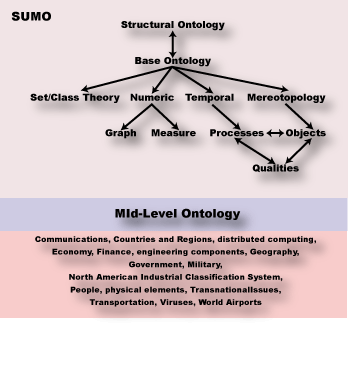- Proof and Assurance classes:
- 1st: Vampire-LTB 1.8 - $1500
- 2nd: iProver-SInE 0.9 - $1000
- 3rd: E-LTB 1.4pre - $500
In summary, "easy" problems that were being solved in 2007 took three minutes to compute. Much harder problems, performing inference over the entire SUMO ontology, are now being solved in around 3 seconds.
The SUMO reasoning prize is for the best reasoning performance on a set of SUMO-based tests.
The SUMO inference prizes totalling US$3000.00 were awarded to the best performance on the SMO category of the LTB division of CASC, held as CADE each year. The LTB division has an assurance ranking class and a proof ranking class. In each ranking class the first place winner received $750, the second place $500, and the third place $250 (a system that wins the proof ranking class might also win the assurance ranking class).
Employees of the sponsor, its subcontractors and funded partners are not eligible. Submission of open source provers is encouraged, although not strictly required.
Previous Year's Winners
2010 Winners: (at CASC-J5)
- Assurance class:
- 1st: iProver
- 2nd: Vampire-LTB 11.0
- 3rd: Currahee
2009 Winners: (at CASC-22)
- Assurance class:
- 1st: SInE-LTB 0.4
- 2nd: iProver-SInE 0.7
- 3rd: Vampire-LTB 11.0
- Proof class:
- 1st: SInE-LTB 0.4 - Krystof Hoder
- 2nd Vampire-LTB 11.0
- 3rd leanCoP-SInE 2.1
2008 Winners: (at CASC-J4)
- 1st (both classes) $1500 - SInE 0.3 - Krystof Hoder
- 2nd (both classes) $1000 - MaLARea 0.3 - Josef Urban
- 3rd (assurance class) $250 - iProver 0.5 - Konstantin Korovin
- 3rd (proof class) $250 - Vampire 10.0 - Andrei Voronkov
| The Suggested
Upper Merged Ontology is a formal theory,
like a dictionary for computers to read, of terms and logical
definitions describing the world.

Reasoning on SUMO means answering a question, much like a database query. In contrast to a web search, which finds a likely answer in text that has already been written, reasoning means combining many small bits of information to compute an answer that has not been previously written, and then reporting the information used and how it was combined to deduce the answer. |